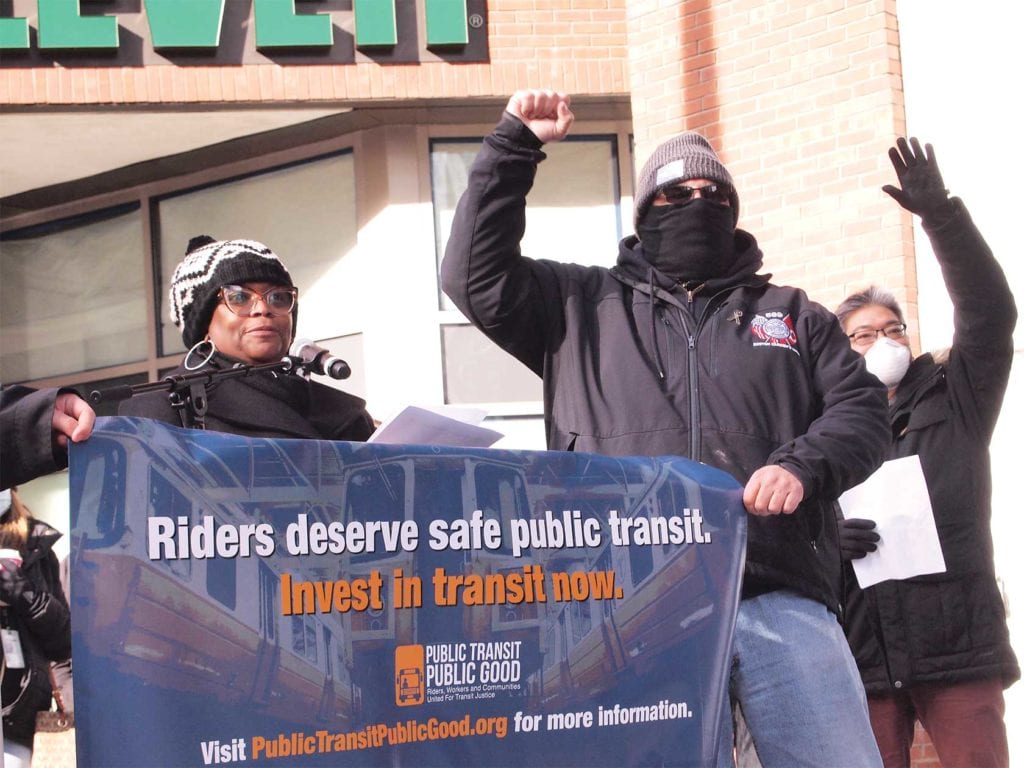Transit activists protest MBTA service cuts
T plans cuts, consolidation of bus routes, reduced frequency for trains

After losing the majority of its riders during the COVID-19 pandemic, the MBTA announced Nov. 9 extensive cuts to service on the T, commuter rail, ferry and buses. Starting January 2021 and continuing through the summer, they will roll back service times and specific lines, prioritizing what they call “essential lines” for communities that rely on public transportation. Activists, transportation workers and others have publicly opposed the cuts, calling all lines essential and warning of the negative effects on bus and train operators.
On Thursday Nov. 19, the Local 589 Carmen’s Union gathered in front of the State Transportation Building for a rally against the cuts. Karen Maxwell, the assistant secretary at Local 589 and former bus operator, said she is not sure if the stable employment the MBTA once provided will be available for the next generation of transit workers.
“The service cuts and the layoffs that the T is proposing will inevitably cut deep and reverse any gains that we have made,” she said in her speech. “Because as much as transit can be a great equalizer, the undeniable truth is that these proposals will disproportionately impact some of Boston’s most vulnerable communities.”
On Dec. 7, the MBTA’s Fiscal Management and Control Board is scheduled to vote on these bus changes:
• Out of 169 bus routes, consolidate 14 routes, shorten five routes and eliminate 25 routes
• No service after midnight
• 60 “non-essential” routes will run 20-30% less frequently
And these rapid transit changes:
• Stop all service after midnight
• Reduce the frequency of all trains by 20%
• E-line service stops at Brigham Circle
The agency also plans to cut all ferry service and severely limit the commuter rail, which lost 87% of its ridership. It will take more than a year to rehire and re-train skilled laborers, the MBTA says.
With these new bus and train schedules, an estimated fewer than 1,700 riders will be stranded on bus routes, and 733 riders will have lack of access to trains. Fewer than 1,000 riders will be diverted by lack of E line access, according to the MBTA.
The MBTA’s proposal also prompted a response from City Councilor Michelle Wu, who wrote that more reliable transit would help reduce the rate of COVID-19 transmission. The City Council adopted Wu’s resolution to oppose the cuts, urging the FMCB to postpone decision-making until they have greater clarity on federal funding.
The Massachusetts AFL-CIO, Chinese Progressive Association, the Public Transit Public Good Coalition and more are advocating for more sustainable and progressive revenues to support MBTA service.
“Public transit is a public good,” said Chrissy Lynch, chief of staff of the Massachusetts AFL-CIO. “It’s time for the state to give it the investment it deserves, by asking corporations to pay their fair share towards all critical public infrastructure.”
One way that wealthy corporations can contribute to transportation funding is through a progressive tax mentioned during Thursday’s rally. Currently there is a flat 5.05% income tax for earners at all levels.
Last year, the state House of Representatives passed the Fair Share Amendment, which proposes an additional tax on all income above $1 million, with the resulting revenues going to education and transportation. If it passes in a constitutional convention during the 2021-2022 legislative session, voters will see the proposal on their ballot in November 2022.
At a virtual MBTA public hearing on Nov. 19, transit riders and workers gave testimony about system-wide changes. Throughout the month of November there will be region-specific meetings, so residents from each area can give more specific testimony. At the hearing, MBTA General Manager Steve Poftak said that the core of this proposal is making sure that transit is preserved for critical populations.
“We’ll be … talking about how the MBTA [can] make the best use of limited resources in order to serve the customers who depend on the T, and also ensure that we’re in a position to bring service back as ridership and revenue returns,” Poftak said.
There is also an online form that riders can fill out to express their concerns about the service cuts, where the MBTA will also collect demographic information.






